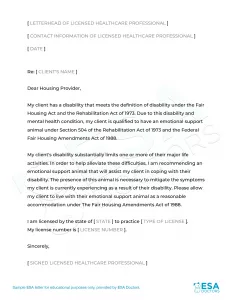Getting an ESA letter for housing is an easy three step process that can be done online as long as the healthcare professional is licensed for the state you live in. Once you have your letter, you’ll gain immediate access to housing rights, including being able to live in no-pet buildings, not having to pay pet fees, and not being constrained by breed and size restrictions.
Here’s how to get an ESA letter for housing:
- Set up an evaluation with a healthcare professional licensed for your state.
- Share your symptoms and needs and how your animal provides you with emotional support.
- Have them write and sign an ESA letter for housing.
If you don’t want to go through the process of finding a health professional, or you don’t want to share your struggles with your current provider, we can help. We have licensed mental health professionals in all 50 states plus Washington DC that understand how ESAs help owners feel better. Click here, and we’ll be able to help you get your ESA letter for housing without all of the stress and hassle.
Not sure if you’re ready just yet? No problem, below you’ll find common questions and information we provide to people just like you who are on the fence. It includes questions you should ask your provider, how to overcome the anxiety of asking, and the housing rights you get with your ESA letter.
Table of Contents
- Who can issue an ESA letter for housing?
- What should an ESA letter for housing contain?
- Where can I use an ESA housing letter?
- Does an ESA letter have to follow a landlord’s form?
- Does an ESA letter have to name my emotional support animal?
- Example of an ESA Housing Letter
1. Who can issue an ESA letter for housing?
Under HUD’s housing rules for emotional support animals, an ESA letter can be issued by licensed mental health professionals, such as social workers, psychologists, psychiatrists, and counselors. physicians, nurses, and physician’s assistants can also issue ESA letters.
Online professionals can write ESA letters as well. HUD recognizes that legitimate ESA letters can come from licensed healthcare professionals who “deliver services remotely, including over the internet.”
Need help? We can help
2. What should an ESA letter for housing contain?
An ESA letter for housing should include the following information:
- The tenant’s name
- The healthcare professional’s name, contact information, and license number
- The type of emotional support animal needed by the tenant (i.e., cat, dog, bird, hamster, etc.)
- A statement that the tenant has a mental health condition that substantially limits at least one major life activity.
- A statement that the tenant requires an emotional support animal to alleviate symptoms of the tenant’s condition.
An ESA letter should always be signed and dated by the licensed healthcare professional. It can be in digital form, such as a PDF, and you don’t need a hardcopy with an original signature.
You don’t have to disclose sensitive details about your condition in an ESA letter; HUD has stated the following: “Disclosure of details about the diagnosis or severity of a disability or medical records or a medical examination cannot be required.”
Healthcare professionals are also bound by ethics rules to keep information regarding their clients confidential. For these reasons, an ESA letter for housing does not have to contain extensive details about your condition. ESA letters for housing can sometimes look generic and impersonal to people not familiar with them and that’s because the healthcare professional is protecting their clients’ confidentiality.
3. Where can I use an ESA housing letter?
An ESA letter can be used for most types of housing, including the following:
- Rental Home
- Apartment
- Condominium
- Home Owners Association (HOA)
- Co-ops
You can use an ESA letter even if your building has a strict no-pets policy or your lease prohibits pets. Keep in mind, however, that some smaller landlords are exempt from Fair Housing rules and don’t have to accept your ESA letter: owner-occupied buildings with no more than four units and single-family homes sold or rented by the owner without the use of an agent.
4. Does an ESA letter have to follow a landlord’s form?
No, you don’t have to follow the landlord’s form for ESA letters or use their specific form; HUD’s rules have made that clear. An ESA letter with the information required under HUD’s guidelines is the only documentation a tenant needs to submit to get accommodation for their emotional support animal.

5. Does an ESA letter have to name my emotional support animal?
An ESA letter for housing should identify the type of ESA you have (i.e., dog, cat, bird, etc.) but does not need to identify the specific animal. Many ESA letters are issued before the tenant actually adopts their emotional support animal. Healthcare professionals are also often not in a position to independently verify specific attributes about an emotional support animal — their role is to evaluate a person’s mental health and needs to see if an ESA recommendation is appropriate.
6. Example of an ESA Housing Letter
The letter below is an example of an ESA letter for housing. However, it is for educational purposes only and not intended to be used — an actual ESA letter must come from a licensed professional who will tailor the ESA letter for each client.
Need an ESA Letter? We can help.
Click on the link below to get started!
Get the Love and Support you deserve!






Would you be able to take your small dog with you in motels when you travel or in airplanes or other transportation. I have a letter from my Neurologist saying it is a necessity for due to current disabilities to be able to keep my dog with me st all times.
Unfortunately ESAs do not have public access rights in places like motels and airplanes. Only service dogs, including psychiatric service dogs, have that right.
My Dr. has written two letters for my ESA i have two dogs stating i need them is there a required wording per HUD guidelines pet screening keeps sending it back after My Dr stated i need my animals for a psychiatric conditions is that not good enough?
We’re not clear on why your ESA letter is being rejected, but you may want to ask what specifically is deficient about the letter under HUD’s standards. Then you can work with your doctor to make any necessary corrections.
Hello,
A current property I have viewed with my daughter. As she is the owner . The agent is asking for a letter dated within 30 calendar days . Her psychiatrist at the time , wrote it last year. Is it necessary to get a new one ? And if so how much do you charge for doing it.
Thank You.
You shouldn’t need to renew a letter that is only a month old. Most healthcare providers will still validate an ESA letter they wrote just one month ago. We do however recommend renewing your ESA letter once a year. If you’d like our help to obtain a new ESA letter, you can find our pricing information here: https://esadoctors.com/pricing-plan/
I gave my landlord a letter from a medical professional b4 I moved in along with a Drs. note. They requested another letter from another professional as they said A BACK UP.My dog IS a real ESA did they have right to ask for another letter?
You do not need a “back up” letter – one ESA letter from a licensed healthcare professional is sufficient for purposes of having an emotional support animal.
My landlord will require that the professional completes and signs their own form along with the ESA letter that you provide, do you guys do that?
An ESA letter should be sufficient to prove that you own an emotional support animal. Many landlords however still persist in asking for additional forms. The LMHPs we work with have lots of experience with these forms and can help you with them (and advise when they are inappropriate).
Do I have to disclose that I have an ESA when I apply for a rental home that says no pets? If I disclose, that leads to possible discrimination, although the landlord could deny discrimination. But if I don’t disclose, then at some point I have to inform them. Should this be done after I receive approval for the home?
We know it can be uncomfortable raising the subject of an emotional support animal with a new landlord. However, be confident in knowing that the law is on your side. We always recommend being upfront with your ESA needs. Disclosing your ESA requirements can surface any issues which can be mitigated early in the process and avoid more unpleasant discussions later on. We wrote a handy guide on the best ways to inform a landlord about your emotional support animal here: https://esadoctors.com/emotional-support-dog-letter-landlord/
My landlord is making it difficult for me to get an ESA, saying that I will be charged monthly then taken to court and I might possibly get evicted. Is this possible to do? Can I be taken to court if I get the proper ESA?
We’re not sure why your landlord is threatening to take you to court. If your landlord is denying your ESA, they need a valid exemption under HUD rules. Such as if they have evidence your ESA is dangerous or a health hazard. You might find this article helpful: https://esadoctors.com/excuses-landlords-deny-emotional-support-animal/
If I try to apply for a home to rent can the landlords/property agent deny me&my kids due to our ESA dog&ESA cats??
Landlords cannot discriminate against tenants solely because they own emotional support animals. That is the very essence of Fair Housing rules. They are designed to protect tenants who need ESAs for mental health support. In order to be protected, make sure you have a valid ESA letter signed by a licensed healthcare provider. That is the only way to legally prove that you own an emotional support animal.